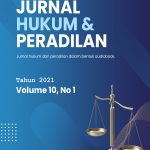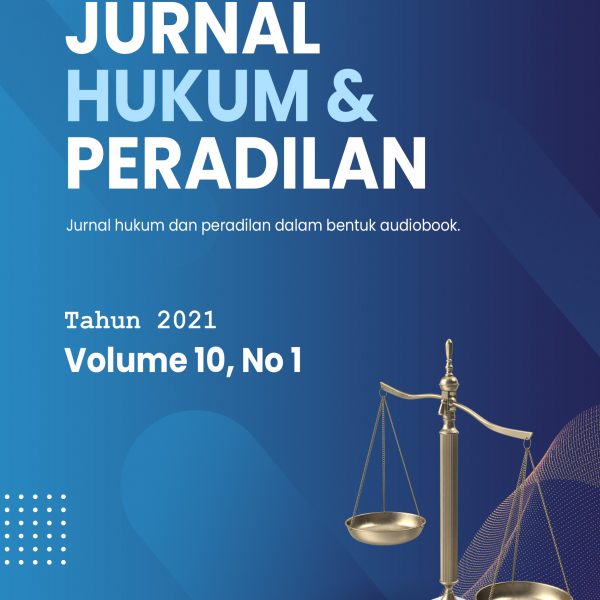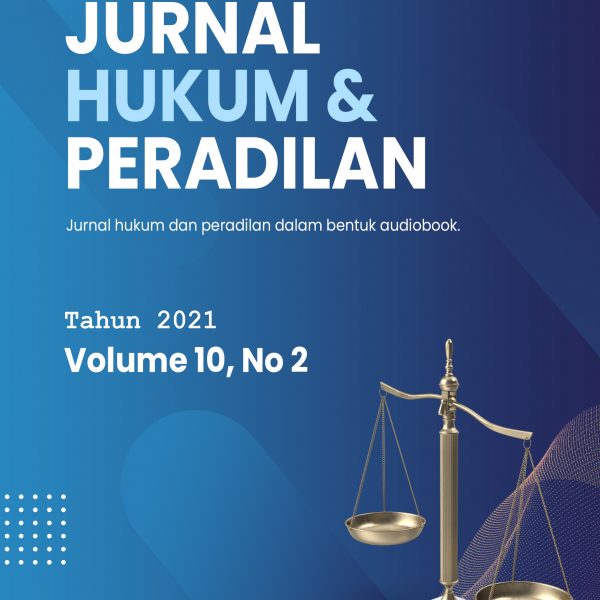
Jurnal Tahun 2021
Volume 10, No 3
Abstrak.
Perubahan UUD NRI Tahun 1945 membawa perubahan besar dalam sistem kekuasaan kehakiman. Pembentukan lembaga baru seperti MK dan KY selain MA, diharapkan dapat mewujudkan cita-cita reformasi dengan prinsip checks and balances. Manifestasi pengaturan kewenangan lembaga kekuasaan kehakiman secara atribusi diatur dalam Pasal 24, 24A, 24B dan 24C UUD NRI Tahun 1945. Berdasarkan sifatnya kewenangan kekuasaan kehakiman mencakup kewenangan limitative dan non limitative yang diatur melalui undang-undang masing-masing lembaga. Namun, pengaturan kelembagaan kehakiman tersebut menimbulkan dilematisasi dan ketidak harmonisan hukum. Hal ini diakibatkan multi tafsir pengaturan kewenangan masing-masing lembaga. Sehingga polemik kelembagaan tersebut diselesaikan melalui proses judicial review. Permasalahan muncul ketika proses revisi undang-undang yang dibatalkan oleh MK, tidak dipenuhi dalam proses legislasi sehingga tetap memunculkan disharmonisasi hukum antar kelembagaan kekuasaan kehakiman.
Abstrak.
Pemberian konsesi oleh pemerintah kepada investor telah menimbulkan banyak konflik pertanahan antara investor-investor pemegang izin, lisensi ataupun konsesi dan masyarakat hukum adat. Data konflik yang telah dicatat oleh Komisi Nasional Hak Asasi Manusia, Aliansi Masyarakat Adat Nusantara maupun Sawit Watch telah mencapai 500-800 kasus konflik tanah antara investor-investor tersebut dan masyarakat hukum adat. Tehadap konflik-konflik tersebut Mahkamah Konstitusi Indonesia kemudian telah mengeluarkan putusan yaitu dalam Putusan Mahkamah Konstitusi No. 35/PUU-X/2012 yang memutuskan bahwa eksistensi hutan adat tidak lagi masuk sebagai bagian dari hutan negara. Artinya Pemerintah harus mengakui eksistensi tanah adat bukan merupakan tanah negara. Menjadi pertanyaan adalah bagaimana kebijakan pemerintah dalam memberikan izin konsesi kepada para investor yang akan mengelola sumber-sumber daya alam dan mineral di atas tanah adat dengan tetap menghargai hukum adat setempat. Penelitian penulisan konseptual ini adalah normatif yuridis dengan pendekatan teori yang dilakukan oleh Lon L. Fuller, yang menyatakan bahwa hukum tertulis yang tidak didasarkan pada hukum adat yang telah mengalami saringan, tidak akan mempunyai basis sosial yang kuat dan menjadi hukum yang tidak efektif serta mengakibatkan merosotnya wibawa hukum. Hasil kajian ini diharapkan pemerintah yang diberikan Hak Menguasai Negara dapat melakukan kewenangannya sesuai konstitusi khususnya dalam membuat kebijakan pemberian konsesi pemanfaatan sumber daya alam di atas tanah adat kepada investor, tanpa menimbulkan konflik hukum dengan Masyarakat Hukum Adat.
Abstract..
The registrar’s position within the Supreme Court is a career position with the status of a Civil Servant, who is specifically tasked with regional and central courts to receive, examine, adjudicate and settle registered cases. The clerk of the court who serves in the Court has an important role in handling the administration of the trial and the execution of the judge’s decision in the Court. This role further clarifies the position and orientation of the function of the part of justice services for citizens optimally. This study aims to develop an education and training policy plan that supports the profession of court officials before carrying out their duties and functions as Registrars.
This study uses a qualitative method with a normative juridical approach in the field of education and training. The results of this study found that the current administration of education and training for registrars, such as curriculum content and learning time is still lacking as a basis for competencies and specifications for job career paths required by the organization. This needs to be adjusted to the needs of the organization in meeting the professional standards of the clerkship position within the Supreme Court.
Abstrak.
Revolusi Industri 4.0 telah memberikan pengaruh terhadap pemutusan hubungan kerja dengan alasan efisiensi. Alasan efisiensi Pasal 164 ayat (3) Undang-Undang Nomor 13 Tahun 2003 tentang Ketenagakerjaan menimbulkan polemik yang berdampak kepada besarnya jumlah pengangguran. Penelitian dilakukan secara normatif yang bertujuan untuk menelaah undang-undang ketenagakerjaan yang belum mampu melindungi hak berkerja di era revolusi industri 4.0. Efisiensi di revolusi industri 4.0 akan mengancam kehidupan pekerja dimasa yang akan datang, dengan tergantikannya tenaga manusia dengan tenaga robot. Hak berkerja yang telah diamanatkan oleh UUD 1945 di dalam Pasal 28A- 28J terancam hilang dengan berkembangnya zaman. Kewajiban konstitusi dari pemerintah untuk menyediakan lapangan pekerjaan bagi pekerja di era revolusi industri 4.0, karena berkerja merupakan hak asasi manusia untuk mempertahankan kehidupannya.
Abstract.
In relation to fulfilling their daily needs, the position and existence of consumers in a dominant society are under businessmen. This has caused the potential loss of customers due to the actions of businessmen. It is not unusual for businessmen to exploit consumers for their interests and advantages without thinking and often neglecting the rights of consumers. This has given rise to disputes between consumers and businessmen that need to be resolved thoroughly and fairly, with legal certainty. The Act No. 8 of 1999 concerning consumer protection has regulated the resolution of consumer disputes which can be carried out outside the court through the Consumer Dispute Settlement Agency (BPSK). The existence of BPSK as a consumer dispute resolution institution does not seem to provide maximum protection to consumers because there are many problems, including the process and procedures for resolving disputes at BPSK. Based on the results of the research and analysis carried out, it is concluded that the resolution of consumer disputes through BPSK in terms of time is relatively faster because it has to be decided within a maximum of 21 working days compared to resolving consumer disputes through general courts which take years. But on the other hand, many problems exist related to the existence of BPSK as a consumer dispute resolution institution, including in the institutional sector, BPSK human resources, inconsistent laws, and so on.
Abstract.
The Law Number 11 of 2020 concerning Job Creation amended 79 laws, including Law Number 5 of 1999 concerning the Prohibition of Monopolistic Practices and Unfair Business Competition. Far from being comprehensive, the Job Creation Law amended the system of law enforcement regarding business competition that had been in place for over twenty years. With a normative method, this research aims to discuss the legal implications of the effectuation of the Job Creation Law regarding the enforcement of the law concerning business competition. This research reveals that Law 11/2020 could lead to a better legal certainty and adequacy of law enforcement concerning business competition in Indonesia in the time to come.






